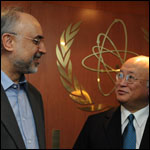Iran Offers IAEA Cooperation, But Sets Condition George Jahn | Associated Press
Iran's foreign minister said Tuesday his country is ready to cooperate more closely with International Atomic Energy Agency but only if it cancels its probe into allegations that Tehran has secretly worked on a nuclear weapons program - a condition rejected by the head of the U.N. nuclear watchdog.
|
|
Elaine Grossman | Global Security Newswire
The highest ranking U.S. military officer said on Thursday that Pakistan's control over its nuclear weapons appears tight enough to protect against the possibility of seizure by extremist sympathizers who might infiltrate the nation's army or intelligence service. Over time, Washington has seen the South Asian nation's atomic arsenal become "physically more secure," Adm. Michael Mullen, chairman of the Joint Chiefs of Staff, said at the Defense Department. "We've seen the training improve" for personnel entrusted with handling and guarding the weapons, he said. Full Article
The Times and Democrat
Federal nuclear safety inspectors are investigating a radioactive waste leak at a Fairfield County nuclear power plant amid increased scrutiny of pipes at the nation's nuclear facilities. The U.S. Nuclear Regulatory Commission says about 100 gallons of liquid waste spilled at the V.C. Summer plant about 25 miles from Columbia, The State of Columbia reported Tuesday. South Carolina Electric & Gas operates the plant. Company officials said the spill was discovered during a routine inspection Thursday and reported to federal regulators the next day. Full Article
Jonathan Soble | Financial Times
Four months after the nuclear meltdowns at Fukushima, the cautious turning away from atomic energy that Japan's government has been signalling may be turning into something else: a fast and disorderly retreat that businesses fear could lead to deepening power shortages. The decision last week by a small-town mayor in southern Japan to withdraw permission for two nuclear reactors to resume operating after an inspection has highlighted the vulnerability of the country's surviving atomic plants to growing anti-nuclear sentiment and the country's shifting, messy politics. Full Article
Michael Krepon | The Hindu
The U.S.-India civil nuclear agreement has already generated a lengthy list of grievances in New Delhi and Washington. The lofty ambitions behind the agreement have been much deflated. U.S. backers of the deal advertised that 27,000 high-quality jobs would materialise from building or supplying nuclear power plants in India. Given the liability legislation passed by the Indian Parliament, these jobs and profits are very unlikely to materialise. Likewise, U.S. defence contractors thought that the deal would place them first in line for the medium multi-role combat aircraft competition, but this hope was dashed. Full Article
Global Security Newswire
The U.S. Cooperative Threat Reduction program dismantled a ballistic-missile submarine during a two-month reporting period this spring, Senator Richard Lugar (R-Ind.) announced on Monday. The Nunn-Lugar initiative in March and April also safeguarded nine nuclear arms train shipments, constructed and outfitted eight biological agent monitoring stations and neutralized 112.52 metric tons of chemical warfare materials. Full Article
|

